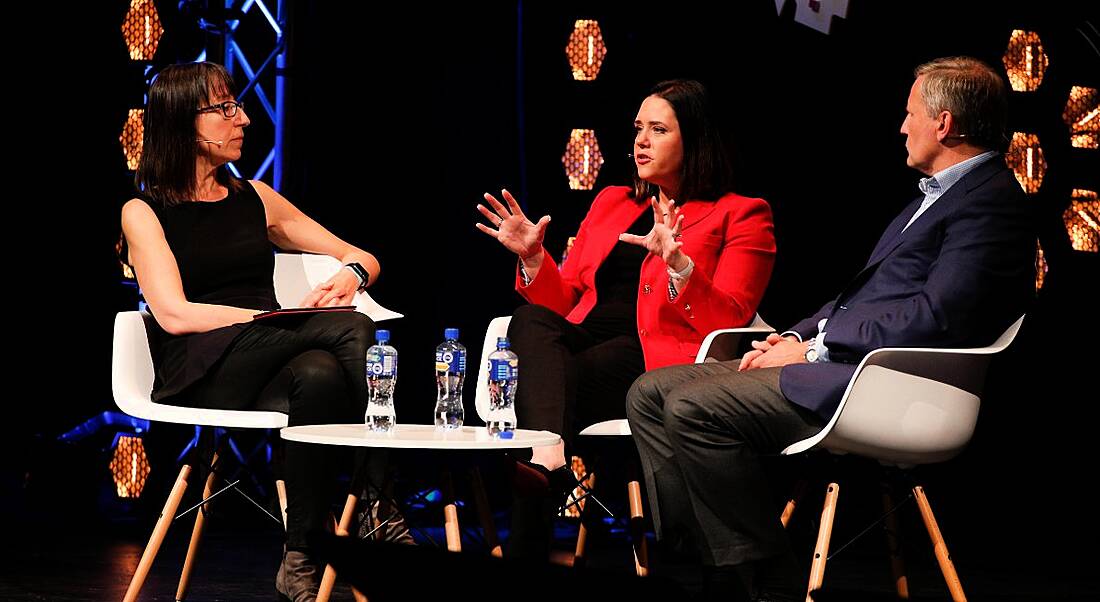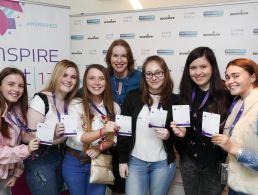Companies could be more effective if they were more focused on achieving greater gender, skills and ethnic diversity at boardroom level, Inspirefest 2017 heard recently.
The old canard ‘who you know’ is unfortunately alive and well in Irish boards, preventing organisations from reaching their full potential.
A stimulating panel discussion called ‘How we will lead in 2020’ – chaired by Inspirefest founder Ann O’Dea and involving Accenture Ireland country managing director Alastair Blair and Symantec board member Dr Anita Sands – indicated that boards are failing their organisations by not embracing greater diversity and giving younger executives a chance.
The conversation was prescient as it came just ahead of a report by the Institute of Directors in Ireland, Diversity in the Boardroom, which found that boards in Ireland lack diversity in terms of gender, skills, race and ethnicity, while women are losing out to men in the ‘who you know’ culture that dominates the appointment process.
The research found that 67pc of directors knew up to three or more people on the board before joining and that men are almost three times more likely than women to be appointed to boards through a direct approach.
Disturbingly, less than 10pc of boards in Ireland have female membership. Around 63pc of women say unconscious bias is the main barrier to the boardroom club.
New blood brings different perspectives
Blair said that while Ireland is a small country and can therefore be nimble and move fast on the issue, one of the sad realities is that most board members in Irish organisations are over the age of 55.
“I worry that there is a 55-plus tick box that starts the discussion rather than what I’ve seen our organisation [Accenture] do, where women and men become board members in their early 40s.”
Blair, who has been with Accenture since 1987, sits on IBEC’s Digital Economy Policy Committee and is actively involved in Ireland’s emerging fintech start-up ecosystem.
Another aspect where board recruitment is failing, he said, is that in most organisations, there is an unwritten precondition that board members have to have prior P&L experience.
“There is a feeling that, ‘Oh heavens, you couldn’t possibly be at board level if you haven’t run a P&L.’
“The final piece that’s missing is, you have to get mentorship in place very early. Superstars don’t appear in their 50s, you can see them miles away.”
Sands currently serves as an independent board director for three Silicon Valley public companies: Symantec Corporation, Service Now and Pure Storage; and as an adviser to Grand Central Tech, a leading NYC technology incubator. She has been honoured on many occasions for her contribution to technology leadership and the advancement of women, and was recently acknowledged by the National Association of Corporate Directors as one of only 39 directors under the age of 40 serving on the boards of publicly traded companies in the US.
Sands said that she was first recruited to board level when she was 37.
“The problem with the situation is that boards insist on two things: you have to be a sitting or current CEO with P&L experience, and the second thing is you have to have prior board experience. So, those two things do a lot to wipe out the pool of potential women.”
Boardrooms need to hear the voice of the customers
Sands said she was fortunate at Symantec when the company’s board took a hard look at itself and realised it needs other voices than older men who were all former CEOs or CFOs.
“They decided: ‘What we really need is a director that brings the voice of the customer.’”
The Symantec board went even further and hired a specialist recruiter because it realised that there was an ample supply of well-qualified women ready to sit on boards.
“She said: ‘Let me present a slate of just female candidates and if you can’t find an outstanding director, I will by all means expand the slate to include men.’
“Since then, she has filled 50 board seats and 97pc of them have been women. Only two of them were current or former CEOs,” Sands said.
“And the other thing that is unusual is that 90pc of them were known to nobody on the boards that they joined. That’s part of the problem, most board recruiting is done from the networks of current boards. That perpetuates the problem.”
Blair said that a way to change the ratio would be for young, driven professionals to try to get board experience early in their careers.
“Some boards require 20 to 30 days a year of your time, particularly in heavily regulated industries. That’s a problem. You could be a board member of a charity in your 20s. The sooner you start, the better.
“We have got to move to get the board thing into people’s mindsets in their late 20s and early 30s. The sooner you get involved and you can see the discourse and understand the obligations, which are significant under the various Companies Acts; once you get your head around it, being a board member is different to being an executive.
“But the sooner you get immersed in it and the mindset, the sooner you learn.”
The opportunity isn’t only for boards to be invigorated by younger blood and different perspectives. Younger members in operational positions can add more to their daily roles if they are equipped with a more strategic picture.
Sands commended Accenture on its approach to empower and encourage executives, male and female, to get more board experience, especially by sitting on external boards whilst still in their operational roles.
“I certainly felt that had I been on a board when I was in my operating role, I would have been far more effective.
“I think it makes people far more effective operating executives and it is also a great developmental opportunity for some of the senior people,” Sands recommended.
Inspirefest is Silicon Republic’s international event connecting sci-tech professionals passionate about the future of STEM. Ultra Early Bird Tickets for Inspirefest 2018 will be on sale soon. Sign up here to be the first to know when!




